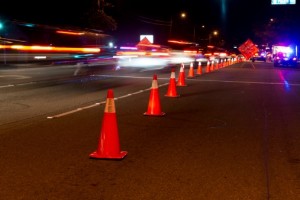Arrested for DUI at a checkpoint? The legality of the checkpoint is one of many factors that must be investigated by your DUI defense attorney.

Now you may already know that the Fourth Amendment of the US Constitution protects us against unreasonable searches and seizures. This means that ordinarily, law enforcement cannot stop you for DUI unless they have probable cause that you are under the influence. DUI checkpoints can get around this protection and stop motorists without probable cause as long as they are operated as “administrative inspections.”
In the landmark case Ingersoll v Palmer, the California Supreme Court identified 8 “functional guidelines” that must be followed for a California DUI checkpoint to qualify as an administrative inspection. If any of these 8 guidelines are not met, it may very well provide an opportunity for your DUI defense attorney to get the charges against you dropped:
- All operational decisions made by supervising officers. This guideline helps ensure that the checkpoint is run in a fair and responsible manner, not arbitrarily or capriciously.
- Neutral criteria for stopping motorists. In the absence of probable cause, law enforcement must follow preset, neutral criteria when choosing which drivers to stop at the DUI checkpoint. For example, they might decide to stop every third driver.
- Reasonable location. Law enforcement can’t just set up a roadblock anywhere they want. They can only choose locations that have a high incidence of DUI accidents and/or arrests.
- Adequate safety precautions. DUI checkpoints should be set up with consideration for how traffic patterns, street layout, and visibility of the checkpoint’s roadblock affect the safety of the public.
- Appropriate timing and duration. Law enforcement officials are expected to use “good judgment” when setting up DUI checkpoints so that they occur at times that are effective for DUI deterrence without being overly intrusive to drivers.
- Clear indications of official nature. DUI checkpoints should be signaled with warning signs, flashing lights, marked police cars, and/or uniformed officers to minimize fear and surprise on the part of drivers.
- Minimal detention time. Drivers should only be detained at the DUI stop for as long as it takes for an officer to check for signs of intoxication. If no signs of intoxication are noted, the drivers must be allowed to leave the checkpoint.
- Advance notice. DUI checkpoints are supposed to be advertised in advance on law enforcement websites and/or local news media.
Arrested at a DUI Checkpoint? Call The Law Office of Michael L. Fell ASAP
If you have been arrested at a DUI checkpoint, the legality of the checkpoint is just one of many possible aspects of your case that your DUI attorney will consider when building your defense. So even if you didn’t see any flaws with the checkpoint, you may still have a good chance of getting the DUI charges against you dropped or reduced. You can rely on Michael L. Fell to work hard to secure the best possible outcome to your case as your DUI defense attorney. Call us at (949) 585-9055 now for immediate assistance.

